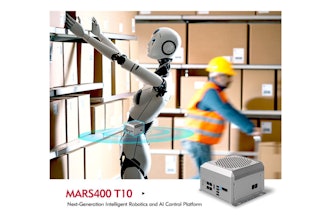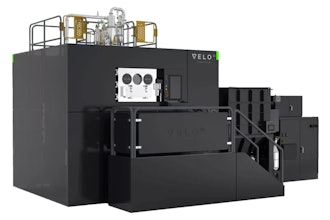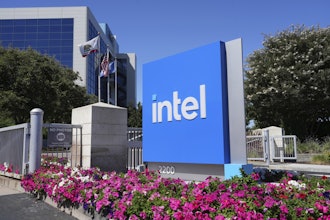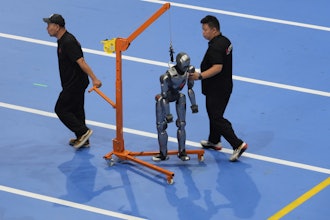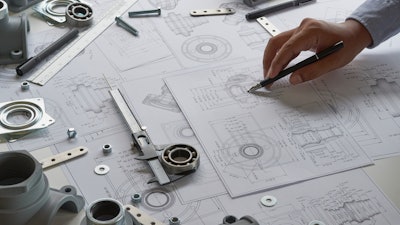
A new survey of 250 engineering leaders at US and European manufacturing companies found that 95% believe it is either critically important or important for design teams to fully adopt AI within the next twelve to twenty-four months. The survey, commissioned by Colab, polled engineering leaders working across the automotive, consumer hardware, heavy machinery, industrial equipment and medical device sectors, with between 1,000 to over 10,000 employees.
Every survey respondent, 100%, said that AI would speed up design review times, with answers indicating that reviews could be conducted nearly three times as fast (2.8x). Automating repetitive design checks will be key to accelerating review times, with engineering leaders estimating that nearly three-quarters (73%) of drawing reviews could be automated. This is critical given the sheer scale of design reviews, with the survey revealing 70% of engineering teams had reviewed between 30,000 to over 50,000 drawings globally, across their organizations, in the last twelve months.
By using AI, design teams have the opportunity to not only increase the speed, but also the quality of design reviews. For example, 95.6% of engineering leaders stated that following company design standards was either critically important or important. But existing processes are ineffective at ensuring these standards are consistently applied. The survey revealed that only 55% of company design standards are documented, current, and frequently used.
David Sellers, Senior Director of Engineering at Hoshizaki America, a manufacturer of ice and refrigeration products for the food service industry, said, “There were a few instances where we had created a standard and, a few years later, I noticed people not even knowing the standard existed. Hoshizaki’s engineering team is working with CoLab to digitize design reviews, capture institutional knowledge, and use AI to flag when a technical decision should leverage reference material."
Adam Keating, Co-Founder and CEO of CoLab, said, “Only about half of company standards are documented, up to date, and consistently referenced today. AutoReview closes that gap – it pulls directly from a company’s own rules, whether they live in a PDF, Excel sheet, or SharePoint folder, and checks designs against those standards automatically. Now, we’re seeing teams start to be motivated to document and update standards, because they know they’ll actually get used.”
While there is strong executive-level support for AI adoption, with no respondents selecting this as a barrier, engineering leaders looking to adopt AI face a variety of challenges. For large enterprises, where data is already organized through product lifecycle management (PLM) systems, the challenge lies in integrating with these systems securely.
“We’ve invested heavily in out-of-the-box integrations with Windchill, Teamcenter, and Dassault 3DEXPERIENCE to solve this challenge for enterprise customers,” says Adam. “With AutoReview built on top of CoLab’s platform, these integrations become even more powerful, pulling your PLM data directly into AI-driven design reviews without adding risk or complexity.”
Smaller companies are concerned that data is not sufficiently organized for AI to be useful. “Spending months on cleanup projects defeats the purpose of productivity gains. That’s why we’ve designed AutoReview to work with whatever you have, in whatever format it’s in,” continues Adam. “You can upload your standards and guidelines as-is, and the AI will ingest and reference them. We also plan to use unstructured data uploads to suggest custom design review checklists. In other words, we’re using AI not just to review your designs, but to make previously unusable data useful.”
One of the biggest challenges flagged by nearly 20% (19.6%) of engineering leaders is change management. “When it comes to AI in engineering, change management isn’t just about learning new tools — it’s about trust,” Adam explains. “AutoReview isn’t replacing engineers; it’s giving them instant access to their organization’s historical technical know-how so they can make more informed decisions. The AI handles the repeatable checks, the engineer makes the judgment calls. We think that’s the sweet spot for both performance and adoption.”
“AutoReview isn’t trying to replace the decisions being made, it leaves the engineer to be an engineer and do what they are trained to do. It will help engineers focus their time where it’s really needed,” David concludes.
Despite these challenges, almost every engineering leader (96%) plans to adopt 2D AI drawing reviews in the next 1–2 years, with half moving in the next six months. CoLab launched AutoReview, the first enterprise-ready AI system that automatically reviews 2D drawings and 3D models, in June this year. The AI tool delivers immediate value by catching errors, missing specifications, and ambiguous notes on in-progress drawings during new product development — preventing costly downstream quality issues.
Techtronic Industries (TTI), the $14B parent company of RYOBI, and wind turbine blade manufacturer TPI Composites are already using CoLab’s AutoReview in beta, and thousands of engineers have already signed up for the waitlist.












